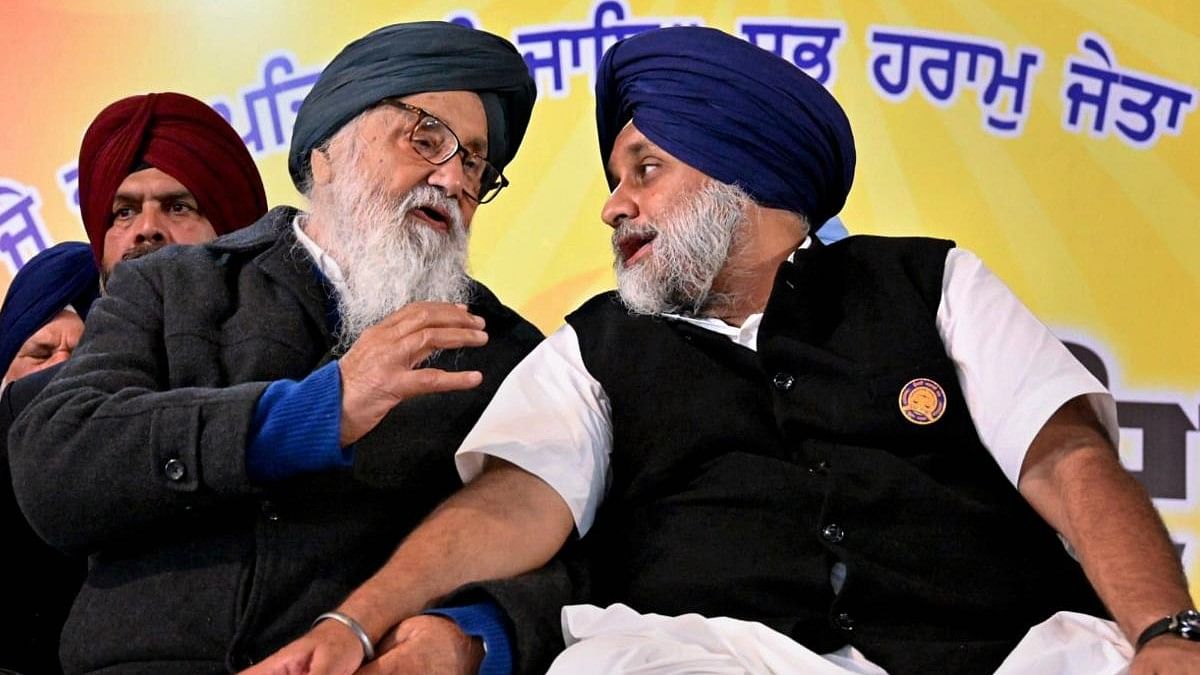
File photo of late Parkash Singh Badal with son and SAD chief Sukhbir Singh Badal.
Credit: PTI File Photo
New Delhi: Surviving a hundred years is a rare feat for a regional political party in our country. And for the Shiromani Akali Dal — the oldest among the lot — survival meant trial by fire all the time. Established in 1920, the journey of Akalis is synonymous with the subcontinent's tumultuous history, including the Partition, statehood movement, and decades of Punjab militancy.
Formed to free gurudwaras from the clutches of priests appointed by the British Raj, the Akalis are used to external and internal challenges alike. Their latest trouble is the emboldened voices of dissent following back-to-back electoral debacles in recent years.
After the decline of militancy in the border state, Akali Dal stalwart Prakash Singh Badal had managed to mobilise moderate elements in the Panthic politics to strengthen the party. However, consecutive defeats in two Lok Sabha and two Assembly elections since 2017 have encouraged a section in the party to seek accountability from Sukbir Singh Badal, son of the Badal Senior, who took over the party's reins after his father died in 2023.
The 2024 Lok Sabha poll was the first time that the SAD contested under the leadership of Sukhbir. In the multi-cornered contest, the Akalis managed to win just one seat — Bathinda — where Sukhbir’s wife, Harsimrat Kaur Badal, scraped through. But the biggest worry for the Akalis was the overall fall in the party’s vote share to 13.5% in the 13 LS segments across the state.
The Akali Dal Bachao Leher (Save Akali Dal chorus) is led by Bibi Jagir Kaur, a former president of Shiromani Gurdwara Parbandhak Committee (SGPC), the institution responsible for the management of Gurdwaras.
While the 100-odd members of the current SGPC and its chief have stood by Sukhbir, the upcoming Assembly bye-election in Jalandhar West has now become a show of strength between the SAD leadership and the rebels.
Surjit Kaur, the SAD candidate in the seat, joined the ruling AAP earlier this week ostensibly as a mark of protest towards apathy by the party leadership. However, within 12 hours, she returned to the party as support poured in from the rebel faction.
Meanwhile, Sukhbir has extended support to the party’s former ally BSP in the seat going to polls on July 10.
This is not the first time that Sukhbir is facing a challenge to his leadership. The first to raise the banner of revolt was his cousin Manpreet Badal after Prakash Singh Badal appointed Sukhbir as the deputy CM in 2009.
A year later, Manpreet, the then finance minister, launched a new party. With Badal Senior firmly in the saddle, the SAD was able to thwart the rebellion to win a second consecutive term in 2012.
Over the next five years, the Badals sought to consolidate their position. When Modi came to power in 2014, Sukhbir’s wife, Harsimrat Kaur Badal, was nominated as a Union minister from the party quota in the NDA government.
The Akalis lost power in the 2017 Assembly polls but the real trouble started two years later, when the BJP, after the 2019 LS polls, tried to push in the Farm Laws which were vociferously opposed by the state's landowning communities, the support base of the SAD.
Harsimrat Kaur had to finally resign from the Modi government in 2020 in the face of a protracted protest by the farm unions. It was too little, too late a gesture as the Congress and AAP had already come out in open support of the farmers.
Having burnt bridges with the BJP, the Akalis tried a new social coalition in the 2022 Punjab Assembly elections by tying up with Mayawati’s BSP, which once had a strong presence in parts of Punjab. The experiment failed miserably as the electorate decided to give the AAP an opportunity to rule the state.
Though the murmurs of dissent have been growing over the last two years, the sudden fall in vote share in the 2024 Lok Sabha elections has triggered the current crisis.
Not only have Bibi Jagir Kaur and her associates sought Sukhbir's ouster, they have also appeared before the Akal Takht, the centre of Sikh religious authority situated in Amritsar, seeking apology for "past mistakes" and religious transgressions during the previous SAD governments under the Badals.
Harsimrat Kaur, the lone SAD MP in the LS, has blamed the BJP for instigating rebellion in Panthic politics. For now, her husband has succeeded in getting the SGPC and various wings of the party to rally behind him.
But in electoral politics, nothing succeeds like success and successions are legitimised by winning polls. As Stalin did in Tamil Nadu, or Akhilesh Yadav in Uttar Pradesh, Sukhbir is yet to lead SAD to power under his leadership.
The SAD has never won an election in Punjab without the support of the BJP or its earlier avatar, the Jana Sangh. The rupture created by the BJP's push for the farm laws and the unease within the Panthic politics over the attempts of RSS to make India a 'Hindu Rashtra' have shattered that Hindu-Sikh coalition of BJP and SAD.
The vacuum thus created has benefited independent candidates like Sarabjeet Singh Khalsa, son of Indira Gandhi’s assassin Beant Singh, and Sikh religious preacher Amritpal Singh who is currently behind bars in Assam.
Former finance minister and BJP leader Arun Jaitley often said that marginalisation of SAD in Punjab politics could give fillip to radical elements. It is to be seen if the SAD, having severed its ties with the saffron party, will be able to reinvent itself in a cluttered polity where AAP has emerged as a key player.